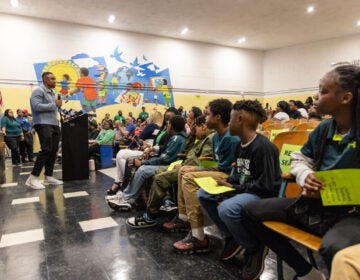Long-awaited hearings on new Philly charter school hopefuls begin
-
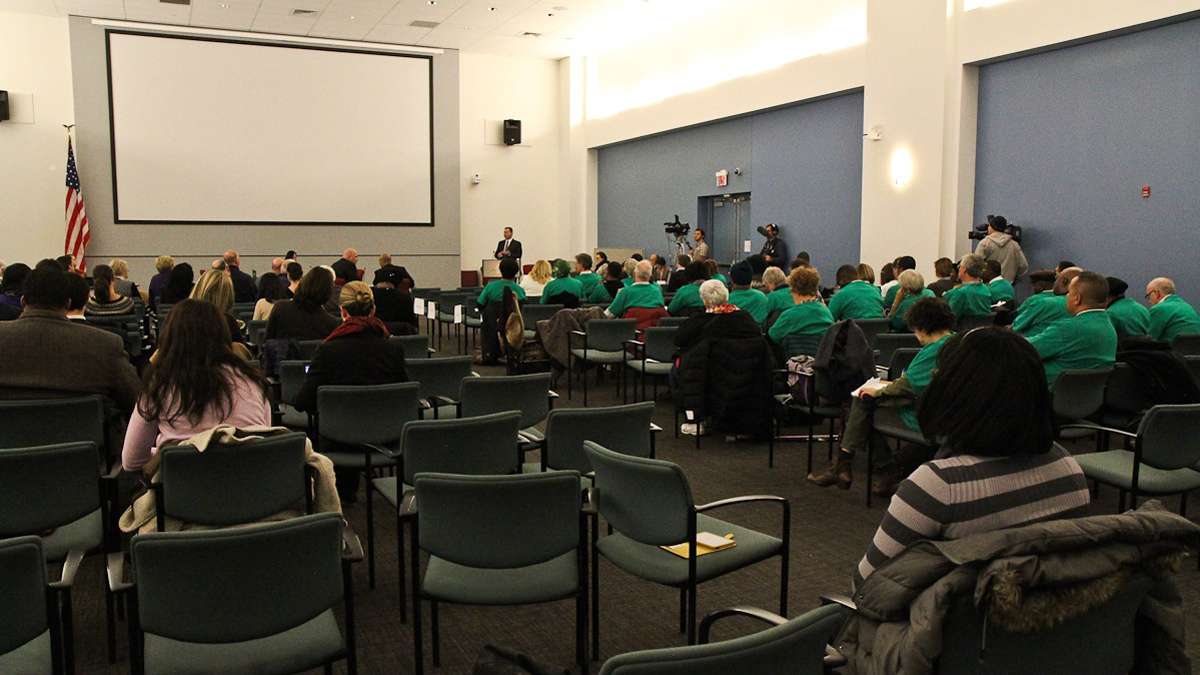
-

-
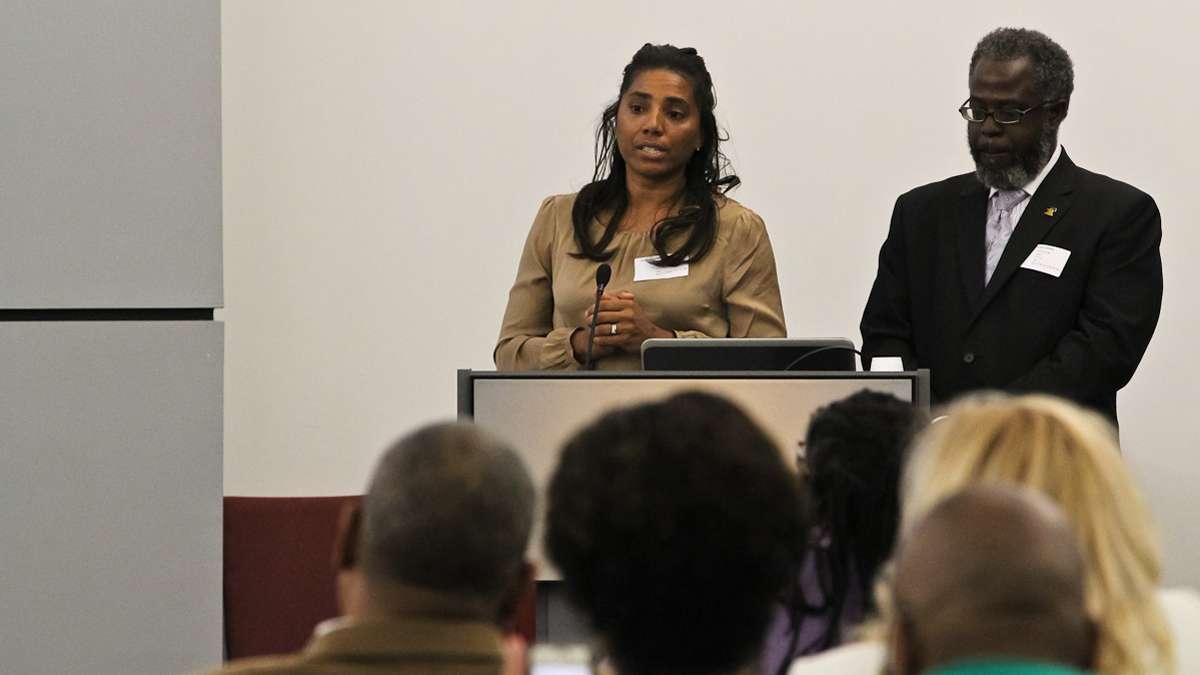
-
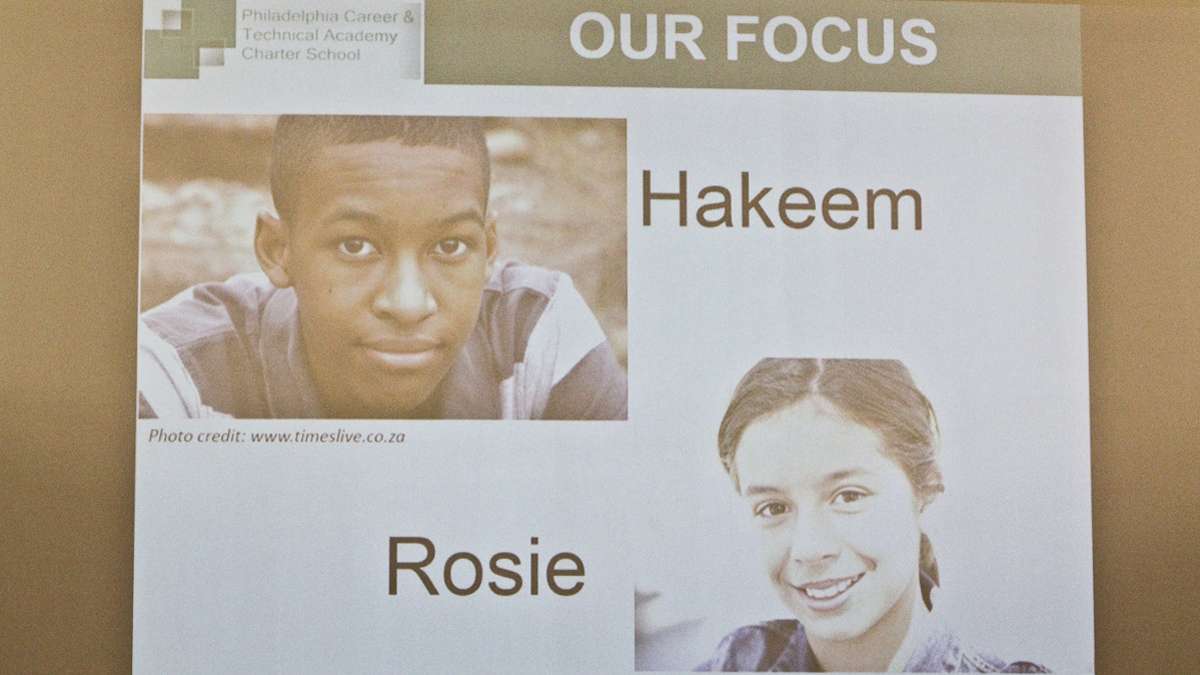
Charter applicant Philadelphia Career & Technical Academy Charter School puts a focus on the lives of two hypothetical students at a presentation on Dec. 8. (Kimberly Paynter/WHYY)
-
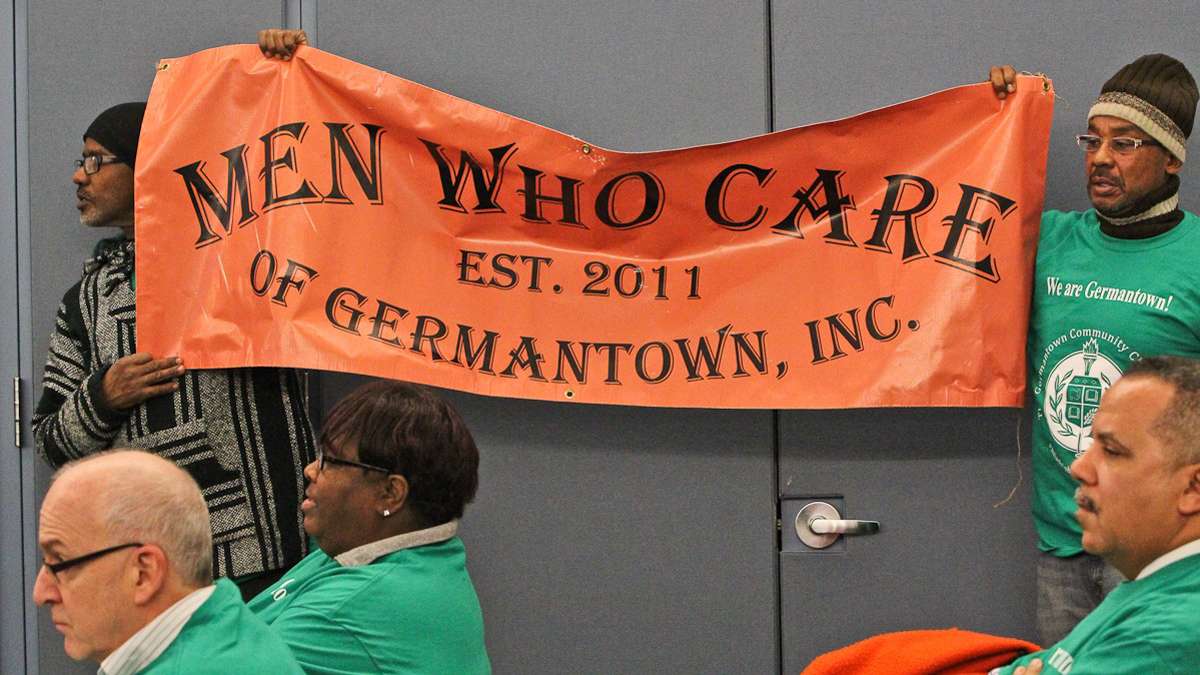
-

For the first time since 2007, the Philadelphia School District heard applications for new charter schools Monday.
For years, citing the costs of growing the charter sector, the district has imposed a moratorium on new charter expansion. That changed this year because of an amendment authored by Rep. John Taylor (R-Philadelphia) that was added to the state cigarette tax authorization bill.
During this moratorium, the district has opened Renaissance charters which task operators with serving all students within defined neighborhood boundaries.
Taylor’s amendment also allows rejected applicants to seek redress with the state Charter Appeals Board.
The district received 40 applications by the Nov. 15 deadline. The state’s charter school law requires districts to hold at least one public hearing on applications within 45 days of receipt.
Germantown proposals
On the first of four days of hearings, the district’s charter school office heard pitches for seven charters: Germantown Community, Philadelphia Career and Technical, Liguori Academy, The Partnership School for Science and Innovation (MaST) and three String Theory campuses in East Falls, Greys Ferry, and Pennsport.
Each applicant had 15 minutes to make a presentation to the district’s charter school office.
Donning green t-shirts, Germantown Community Charter’s supporters comprised a large chunk of the onlookers at the onset of the hearing. They hope to reoccupy Germantown High School, which the district shuttered in 2013, with a grades 6-12 charter serving 1,050 students.
“This application represents community power,” said Yvonne Haskins, a board member of Germantown United Community Development Corporation. “This application could be the cornerstone of what we’re trying to accomplish in Germantown.”
Joe Budd, of the non-profit Men Who Care of Germantown, said the closed building has become an “eyesore” that is “driving property values down” and increasing crime.
Germantown Community Charter’s pitch cited a dearth of other good public school options in the area and referenced the possible closures of three other nearby charter options: Imani, Imhotep, and New Media.
The group said its charter would be a “community school,” that focused in part on preparing students for careers in hospitality, tourism, and construction. The group’s architectural redesign plan envisions a restaurant and a boutique hotel to be developed on the existing school property.
The Philadelphia Career and Technical Academy Charter School also proposed a new charter in Germantown – a 600-student high school where students would earn certifications necessary to gain employment in industries such as nursing, automotive repair, culinary arts, computers, and business administration.
Organizers guaranteed “top notch internship and externship options.”
The school’s application was organized by WAY Haberdashery.
MaST proposals
The Partnership School for Science and Innovation, a school focused on math, science and technology proposed by the existing MaST charter, hopes to attract and retain families to the Center City Zip codes that have seen a population surge over the past decade.
MaST CEO John Swoyer said the school would also enroll 20 percent of its students from the city’s most impoverished Zip codes.
MaST’s Powerpoint presentation highlighted the fact that two of Center City’s high-performing neighborhood elementary schools, Meredith and McCall, are currently enrolling students beyond capacity.
Organizers say they hope to locate the school on Market Street. MaST cited a location in South Philadelphia as its first choice on its application, which was explained as an “error” at the meeting.
The schools hopes to grow into a full-fledged, 1,500-student K-12. Swoyer proposed opening a kindergarten and a 9th grade in 2016.
MaST will testify about a proposed open-catchment charter to be located on Roosevelt Boulevard in the Lower Northeast on Friday.
Liguori Academy
Liguori Academy, a charter based on the philosophies of an 18th century Catholic bishop, aims to create a high school for students most at-risk of becoming drop-outs.
Rev. Michael Marrone, the potential school director at Liguori, began his pitch by addressing the school’s perceived religious affiliation. Marrone said he’d first attempted to associate the school with the Archdiocese of Philadelphia, but changed course when that didn’t work out.
“When the plan’s not working, you change the plan and not the goal,” said Marrone, who is on a leave of absence from the priesthood.
Now he hopes to open the 1,200-student school without religious affiliation.
Liguori, which received a planning grant from the Philadelphia School Partnership, has a board of directors that includes city District Attorney Seth Williams, Electrical Workers Local 98 labor boss John Dougherty, and former Flyers goaltender Bernie Parent.
“I see everyday the results of a broken school system,” said Williams at the hearing. “The No. 1 thing defendants have in common is that they didn’t finish high school.”
Williams, who in the past has called for parents to receive felony charges for their chronically truant children, said he has been “thwarted by the SRC” in each of his attempts to bring truancy rates down.
Liguori submitted written support from Cabrini, Villanova and St. Joseph’s Universities, as well as the office of Gov. Tom Corbett, state Rep. John Taylor, and City Council members Jannie Blackwell, Blondell Reynolds Brown, Bobby Henon, and Mark Squilla.
String Theory Schools
Jason Corosanite, chief innovations officer of String Theory Schools, urged the SRC to approve new K-12 charters proposed by his organization for East Falls, Greys Ferry, and Pennsport, each serving 1,300 students.
In Pennsport, String Theory hopes to open its school in the shuttered Abigail Vare elementary.
Based on the success of its other schools in Philadelphia, Corosanite said lawmakers across the country have been “begging” String Theory to build schools in their home states.
“We’d love to build them here, but it’s up to this city to decide whether we’re going to do that or not,” he said.
“We need these choices in our neighborhoods,” said state Rep. Bill Keller (D-Philadelphia), about String Theory.
String Theory founder and CEO Angela Corosanite said the district’s charter office told her in 2010 – under then-Superintendent Arlene Ackerman – that she needed to “spread the model across the city” because parents want better schools in their communities.
String Theory will testify Friday about a proposed charter in Port Richmond.
District officials maintain that their ability to authorize new charters is currently limited due to fiscal constraints.
“As a district, we have to look at our entire portfolio of schools holistically,” district chief financial officer Matt Stanski said in a November phone interview, “and just really determine the best way to educate over 200,000 students in the most cost-effective manner.”
Voices pro and con
After Monday’s formal presentations, the district received public comment from parents, students and community stakeholders who argued both for and against charter expansion.
West Philadelphia’s Brian Canella came in support of his former teacher at West Catholic, Liguori Academy’s Rev. Mike Marrone.
“He introduced us to a variety of possibilities…that will allow us to get past the stigmas that were placed upon us, to get beyond the crutches that held us down,” he said. “He empowered us, not enabled us.”
Temwa Wright, mother of two students at E.M. Stanton Elementary, and one at CAPA, urged the SRC to maintain its moratorium on charter expansion.
“If you have four hungry children who you are barely feeding, does it make sense to adopt two more?” asked Wright. “If you approve more charter schools, especially in areas where neighborhood public schools are making progress, it would deplete resources to existing schools.”
Parent Pamela Roy, whose child is not yet school-aged, testified against String Theory’s expansion into her East Falls neighborhood, fearing it would lead to the closure of Thomas Mifflin elementary.
“Mifflin is a small neighborhood school with a family feel, a hub of the community,” said Roy, who recently joined the Friends of Mifflin.
Gina Snyder, director of the East Falls Development Corporation, took the opposite view – saying she was speaking as a parent, not for the EFDC.
“In the past 10 years, I’ve seen family after family leave the city because of the schools,” she said. “We all lose when that happens.”
Snyder, who has two boys, aged 5 and 6, served on the first board of directors for Green Woods Charter in Roxborough.
In an official release distributed to reporters, Philadelphia Federation of Teachers president Jerry Jordan joined the call for a continued moratorium.
“Until every traditional public school has what it needs to provide high-quality learning environments for our children, we should not even entertain the thought of spending hundreds of millions of dollars more on charter schools at the expense of traditional public schools,” he said.
Monday’s hearings were not attended by Superintendent William Hite, nor any members of the School Reform Commission. They will attend the second round of hearings scheduled for mid-January.
WHYY is your source for fact-based, in-depth journalism and information. As a nonprofit organization, we rely on financial support from readers like you. Please give today.



